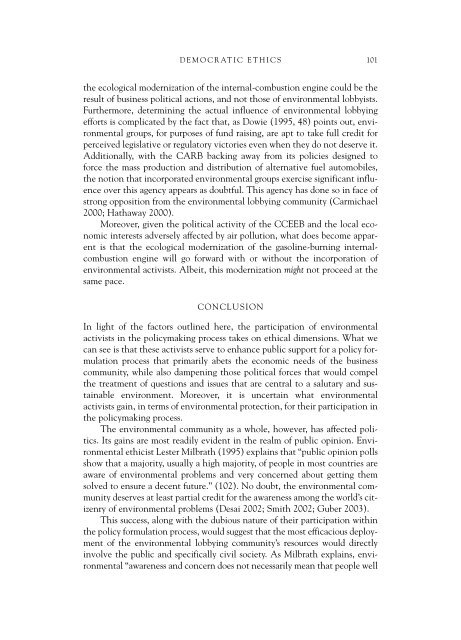GEORGE A. GONZALEZ - fieldi
GEORGE A. GONZALEZ - fieldi
GEORGE A. GONZALEZ - fieldi
Create successful ePaper yourself
Turn your PDF publications into a flip-book with our unique Google optimized e-Paper software.
DEMOCRATIC ETHICS 101the ecological modernization of the internal-combustion engine could be theresult of business political actions, and not those of environmental lobbyists.Furthermore, determining the actual influence of environmental lobbyingefforts is complicated by the fact that, as Dowie (1995, 48) points out, environmentalgroups, for purposes of fund raising, are apt to take full credit forperceived legislative or regulatory victories even when they do not deserve it.Additionally, with the CARB backing away from its policies designed toforce the mass production and distribution of alternative fuel automobiles,the notion that incorporated environmental groups exercise significant influenceover this agency appears as doubtful. This agency has done so in face ofstrong opposition from the environmental lobbying community (Carmichael2000; Hathaway 2000).Moreover, given the political activity of the CCEEB and the local economicinterests adversely affected by air pollution, what does become apparentis that the ecological modernization of the gasoline-burning internalcombustionengine will go forward with or without the incorporation ofenvironmental activists. Albeit, this modernization might not proceed at thesame pace.CONCLUSIONIn light of the factors outlined here, the participation of environmentalactivists in the policymaking process takes on ethical dimensions. What wecan see is that these activists serve to enhance public support for a policy formulationprocess that primarily abets the economic needs of the businesscommunity, while also dampening those political forces that would compelthe treatment of questions and issues that are central to a salutary and sustainableenvironment. Moreover, it is uncertain what environmentalactivists gain, in terms of environmental protection, for their participation inthe policymaking process.The environmental community as a whole, however, has affected politics.Its gains are most readily evident in the realm of public opinion. Environmentalethicist Lester Milbrath (1995) explains that “public opinion pollsshow that a majority, usually a high majority, of people in most countries areaware of environmental problems and very concerned about getting themsolved to ensure a decent future.” (102). No doubt, the environmental communitydeserves at least partial credit for the awareness among the world’s citizenryof environmental problems (Desai 2002; Smith 2002; Guber 2003).This success, along with the dubious nature of their participation withinthe policy formulation process, would suggest that the most efficacious deploymentof the environmental lobbying community’s resources would directlyinvolve the public and specifically civil society. As Milbrath explains, environmental“awareness and concern does not necessarily mean that people well









